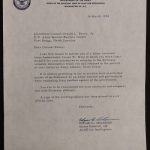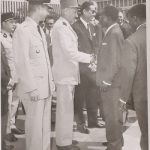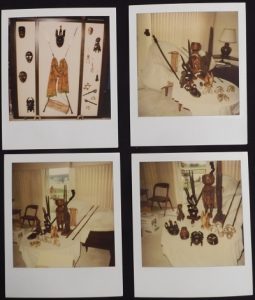THE PERRY COLLECTION:
HISTORY OF THE REGION AND COLLECTION
Brief History of the Region in the Early 1960s
At the height of the Cold War in the early 1960s, the Ivory Coast was one of several dozen African colonies to transition to an independent nation, officially becoming a nation on August 7, 1960. Independence for the colonies came at a price, often accompanied by massive unrest and political turmoil as young governments rose to power.
Simultaneously, rising military tension between the Soviet Union and the free world, highlighted by events such as the Cuban Missile Crisis of 1962, further escalated the stakes for the infant countries. The Soviet Union eyed Africa as fresh territory for the spread of Communism, taking strong interest in colonies’ independence movements and resources.
Colonel Gerald Perry, a United States Army attaché, was assigned to monitor the complex Ivory Coast political arena from 1962 to 1964. Colonel Perry and his wife, Dorothy, lived in Abidjan, a bustling sea port and then-capital of the Ivory Coast. Colonel Perry traveled widely in West Africa, gathering intelligence from meetings with government officials and tribal leaders.
 At the conclusion of Colonel Perry’s assignment, Major General Edgar C. Doleman, the U.S. Army’s Assistant Chief Staff for Intelligence, commended him for his service in a letter that is included in this collection:
At the conclusion of Colonel Perry’s assignment, Major General Edgar C. Doleman, the U.S. Army’s Assistant Chief Staff for Intelligence, commended him for his service in a letter that is included in this collection:
“I use this means to inform you of a letter received from Ambassador James. W. Wine in which you were commended for your astuteness in relaying to the Embassy valuable information which you had obtained in the pursuit of your duties as Army Attaché, Ivory Coast.”
Of course, the “valuable information” was never divulged in the letter, and in fact, Colonel Perry never discussed specifics of his assignment with anyone other than whom he was allowed to in the military.
 Another of the documents is a photo of a ceremony on August 7, 1963, the third anniversary of the Ivory Coast’s independence. Colonel Perry is standing next to French President Charles de Gaulle, who is perhaps shaking the hand of Ivory Coast President Félix Houphouët-Boigny (though this has not been validated).
Another of the documents is a photo of a ceremony on August 7, 1963, the third anniversary of the Ivory Coast’s independence. Colonel Perry is standing next to French President Charles de Gaulle, who is perhaps shaking the hand of Ivory Coast President Félix Houphouët-Boigny (though this has not been validated).
These and numerous other documents included in the collection are proof of Colonel Perry’s time in the Ivory Coast.
An American Spy’s African Artifacts Collection
Colonel Perry and Dorothy traveled widely while in the Ivory Coast, sometimes attending formal high-level government galas, which a number of documents in this collection attest to. Colonel Perry gained the trust of numerous tribal leaders, who generously bestowed precious tribal-made crafts to the couple in appreciation of their friendship. Additionally, Colonel Perry and Dorothy purchased other artifacts from markets on their travels.
 Following their return to the United States and particularly in retirement, Colonel Perry and Dorothy proudly displayed this artifact collection in their homes. While living in Washington’s Puget Sound area, the Perrys adopted a puppy from a puppy breeder and her husband on the Olympic Peninsula. The two couples’ friendship blossomed, and because the Perrys did not have children, they willed the African collection to their friends upon their passing.
Following their return to the United States and particularly in retirement, Colonel Perry and Dorothy proudly displayed this artifact collection in their homes. While living in Washington’s Puget Sound area, the Perrys adopted a puppy from a puppy breeder and her husband on the Olympic Peninsula. The two couples’ friendship blossomed, and because the Perrys did not have children, they willed the African collection to their friends upon their passing.
Now that the friends are getting older, they wish to sell the collection. They want the collection to remain whole, and hopefully to be proudly displayed just as it was in the Perrys’ homes. Perhaps in a museum or a private collector’s home?
For more information or to inquire about purchasing this historic collection, please visit our contact page.